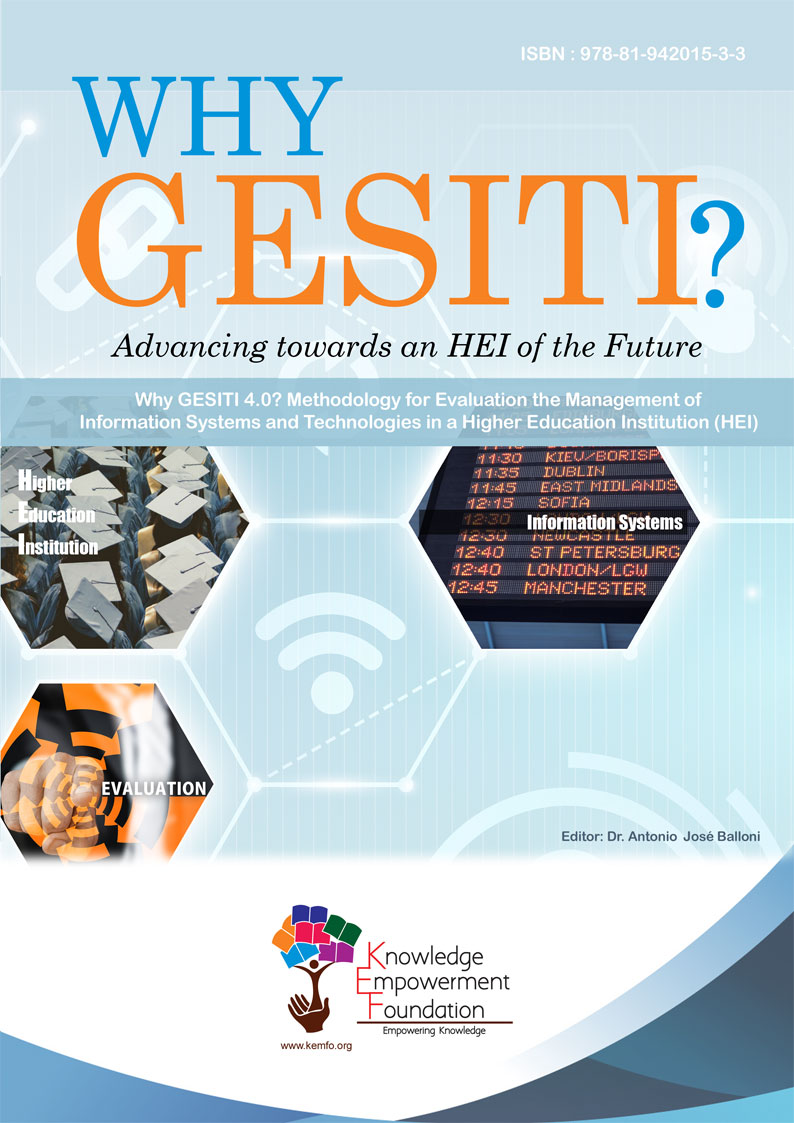ISBN: 978-81-942015-3-3
Author: Antonio José Balloni
WHY GESITI 4.0
₹3,000.00
ISBN: 978-81-942015-3-3
Author: Antonio José Balloni
ISBN: 978-81-942015-3-3
Author: Antonio José Balloni
About Editor
BOOK/LIVRO:
GESITI EDUCATION 4.0
Why GESITI? Methodology for Evaluation of the Management of Information Systems and Technologies in a Higher Education Institution -HEI -:
Advancing towards an HEI of the Future.
Por que GESITI? Metodologia para Avaliação da Gestão dos Sistemas e Tecnologias da Informação em uma Instituição de Ensino Superior – IES -:
Avançando para uma IES do Futuro.
Organizer/Editor/Technical Reviewer & Structuring: Dr. Antonio José Balloni <https://orcid.org/0000-0002-7703-0852 >. Universidade Estadual de Campinas -UNICAMP-, Instituto de Economia -IE-, Núcleo de Economia Industrial e da Tecnologia -NEIT-
Biography: Antonio José Balloni (balloni@unicamp.br).
| 2020 to date: | Collaborator Researcher at Center for Industrial Economics and Technology – I/E-UNICAMP < https://bit.ly/358Xil2 > & < https://bit.ly/2J9bVMm > (Full-time) |
| 2020 to date: | Collaborator Researcher at Future Study Group – PUCSP < https://bit.ly/31QUuG0 > & < https://bit.ly/2PR58a1 > (Part-time) |
| 1988 to 2020: | Researcher at Center for Information Technology Renato Archer -CTI/Brazil-. (antonio.balloni@cti.gov.br) |
| 1988-2002: | MICROELETRONICS: < https://bit.ly/37ed8dI > & < https://goo.gl/FmdPb4 > |
| 2002-2020: | GESITI PROGRAM creator: Management of System and Information Technology towards Organizations: < https://bit.ly/366UepM >. |
| 2018 to 2019: | Member from the Commission for Decision Making and Choice from the news members for the Scientific-Technical Council from CTI Renato Archer. |
| 2017 to date: | Assessor from FAPESP |
| 1979 to 2019: | Basketball coaching & player -. |
| Brazilian champion in basketball -Master Category-. Easy visualization -need login-:< https://bit.ly/3jF5huZ > or: Direct download: < https://bit.ly/3hA3JjW >. |
|
| 2015 to 2018: | Member from the Human Resources Commission for Researchers Improvements. |
| 2003 to 2018: | General Manager of nine editions of an international GESITI Workshop: < https://bit.ly/33eMsrQ > |
| 2014 to 2017: | NSF assessor -invited by Prof. Dr. Maryann Feldman- |
| 2014 to 2015: | Postdoctoral researcher in the UNC at Chapel Hill/Department of Public Policy/USA, aiming at contributions to Artificial Intelligence improvements in the understanding of human beings’ cognition: < https://goo.gl/VFu9y6 >. |
| 2005 to 2014: | invited professor by the Institute of Economics/UNICAMP, lecturing about Management Information System |
| 2010 to 2012: | Member of the Scientific-Technical Council at CTI/MCTI. Member of the Commission for Probationary Evaluation. |
| 1993 to 1993: | Postdoctoral researcher at IMEC/Microelectronics/Belgium < https://bit.ly/378I52H >. |
| 1986 to 1988: | Researcher at Instituto de Estudos Avançados -IEAv/CTA < http://www.ieav.cta.br/ > |
| 1977 to 1988: | Ph.D.; MSc and, Baccalaureate by Institute of Physics/UNICAMP < https://portal.ifi.unicamp.br/en/ > |
Publications:
- 04 books: < https://www.researchgate.net/project/GESITI-BOOKS >
- 70 papers: < https://goo.gl/GctvFZ >
- GESITI/Health paper selected as the best from the congress < https://bit.ly/2U0gcDx >, see also < https://goo.gl/1wZKM2 >.
- GESITI/Health in the Brazilian Business Awards 2017 < https://goo.gl/rXxLqX >
- GESITI Health best paper < https://goo.gl/HJ259N >.
- STRATEGIC ´PROJECTS -under construction-: < https://bit.ly/3gZgDHC >
# Belongs to a beekeeper family, an ecologically correct endeavor with technological innovation < https://bit.ly/30qo6rp >
# Have Italian roots –Brazilian and Italian citizenship-
Overview of Book
BOOK/LIVRO:
GESITI EDUCATION 4.0
Why GESITI? Methodology for Evaluation of the Management of Information Systems and Technologies in a Higher Education Institution -HEI -:
Advancing towards an HEI of the Future.
Por que GESITI? Metodologia para Avaliação da Gestão dos Sistemas e Tecnologias da Informação em uma Instituição de Ensino Superior – IES -:
Avançando para uma IES do Futuro.
Organizer/Editor/Technical Reviewer & Structuring: Dr. Antonio José Balloni <https://orcid.org/0000-0002-7703-0852 >.
Universidade Estadual de Campinas –UNICAMP-, Instituto de Economia -IE-, Núcleo de Economia Industrial e da Tecnologia -NEIT-
< https://www.unicamp.br/unicamp/english >
Publisher: KEMFO -Knowledge Empowerment Foundation – ISBN: 978-81-942015-3-3
KEYWORDS:
- GESITI/Education 4.0.
- Education Management.
- Education Information Systems.
- Information Technology.
- Research Agreement.
- Cooperation Term.
- Informed Consent.
- Multifocal Methodology.
- Prospective Questionnaire.
- Knowledge Management.
- Information Security.
- Accessibility.
- Entrepreneurship.
- Communication Management.
- Digital Competences
PREFACE:
1.2 – As wrote Dr. Renato Opice Blum Lawyer and Economist – < www.opiceblum.com.br >-: “[…] this work that reflects an important project and a fascinating subject:
Education 4.0.
The Third Industrial Revolution refers to the digital revolution at the end of the 20th century when analog systems were transformed into digital systems through electronic devices and information technology. From then on, new technologies promise to dominate the physical and digital world and take on such an essential role in our society that we now refer to this new period as the Fourth Industrial Revolution.
This Fourth Revolution coined the term 4.0, which is now applied to various sectors of society, which, as a whole, is undergoing a profound transformation. In this 4.0 society, the human being ceases to perform multiple functions that machines now perform, which puts him in a position to reinvent himself to assume other relevant roles in interaction with these new technologies.
To accompany this new role of the human being, a new form of education becomes paramount: Education 4.0. The next generations of students will be through this new way of educating, victims, and authors of this revolution in society.
We realized for some time, and it became even more evident in a pandemic moment, how much the near future holds a hybrid education system and the importance of managing the educational system to take advantage of technology to its benefit. In this sense, care with information security, systems management, and the protection of the entire educational system’s data is becoming increasingly important.
Already aware of its need to monitor this moment, the Researcher Antonio José Balloni, coordinated some research projects, including the creation of the GESITI / Education 4.0 Project, which presents, in this book, an original Methodology for the Assessment of Management of Information Systems and Technologies in a Higher Education Institution; a unique and relevant Evaluation Methodology for Education 4.0, reflected in this work.
The 4.0 Education is the way to create 4.0 Humans prepared to face and develop 5.0 Society […].”
THE BOOK
2.2 – Also, as wrote the Editor do this Book, Dr. Antonio J. Balloni: The book GESITI/Education 4.0 is vital for you, for your Higher Education Institution -HEI-, for Brazil and countries interested in the theme. With a multifocal prospective methodology, it aims to study the management of information systems and technologies in Higher Education Institutions -HEI-, in Brazilian and international universities. The method consists of eight modules that propose to map educational institutions’ needs and demands, producing knowledge. Due to the multifocal characteristic of these Modules, it is possible to get information for decision-making support regarding managerial concerns of interest for a 4.0 Education-.
The knowledge production: the production of knowledge is generated by applying individual modules -1 to 9- in HEI. The suggestions for the implementation of these modules -FIELD RESEARCH APPLICATION-, should follow one of these three proposals, presented in order of increasing importance and analyses impact:
1.3 – The application of all eight modules in unique field research following by a complete integration and correlation analyses of the data obtained. The more HEI making part in the implementation of the Module during the field research, the better;
2.3 – The same above but the application of two or more modules according to a particular choice or needs. The more HEI making part in the implementation of the Module during the field research, the better and,
3.3 – The same above but the application of only one Module according to a particular choice or needs. The more HEI making part in the implementation of the Module during the field research, the better.
The results: the results obtained can support public policies and other decision-making concerned with the improvement processes in several areas from a IHE, according to the content of each specific Module.
Although the book GESITI /Education 4.0 is to be implemented in a HEI, public or private, the nime modules’ content can also be adapted for application in High School Institutions -IHSI-.
The 8 Modules: the modules presented in this book are:
Module 1: Structuring, with general questions related to a higher education institution -HEI-;
Module 2: Levers of Results Within a 4.0 Educational Management System;
Module 3: Knowledge Management in a 4.0 HEI;
Module 4: Information Security in a 4.0 HEI;
Module 5: Knowledge Flow & Innovation Opportunities in a 4.0 HEI;
Module 6: Accessibility in a 4.0 HEI;
Module 7: Entrepreneurship in 4.0 HEI and,
Module 8: Communication Management in a 4.0 HEI.
Module 9: Management of Teaching Digital Competences in 4.0HEI





